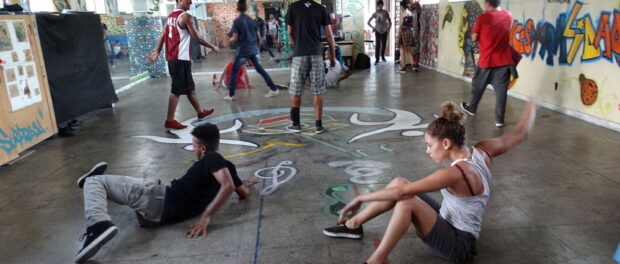
A community organization in the West Zone neighborhood of Bangu is working with young people, children and families to combine cultural events, classes and activities and citizenship discussions and put West Zone culture on the map. Caixa de Surpresa (Jack-in-the-Box) was initiated in 1982 by a group of musicians in the Vila Aliança favela and officially registered as an NGO in 2004. First featured on RioOnWatch in 2011, today the organization uses its space and resources to offer a wide range of arts and culture workshops and act as a cultural hub for the region.
Caixa de Surpresa’s projects coordinator Leidimar Machado explains that the organization has a strong youth focus: “Our function is to work with young people and offer art and culture, but also discuss vulnerabilities and strengthen their potential so they can see themselves within the arts and foster transformations within their communities.”
Caixa de Surpresa provides free arts, performance and sports classes to community members of all ages at their base, an abandoned City government building which they have used since 2008 and transformed over the last five years. Classes include judo, capoeira, African dance, drama and break dancing. Art classes are also provided such as drawing, percussion and instrument making. Current projects include a recording studio for those interested in producing music and the continual renovation of their space.
As well as classes and workshops, the Caixa de Surpresa space functions as a meeting place and cultural hub hosting a wide variety of events, including a fortnightly hip hop circle, rock event, samba and the Roda Cultural de Bangu (Bangu Culture Circle).
Distant from the central and South Zone regions where Rio’s cultural initiatives and centers are concentrated, the West Zone has historically lacked the resources and spaces to support a cultural scene. Caixa de Surpresa’s work, offering classes, a meeting space for artists and musicians and hosting cultural events, is essential to address this.
Leidimar says: “Finally the [cultural] movement in the West Zone is growing a lot. There’s a lack of arts and cultural spaces, and this has become a multiple-use space, aggregating culture as a whole and attracting people from other places.” She explains that residents from neighboring Realengo and Vila Kennedy attend culture events at Caixa de Surpresa and discusses the organization’s plans to diversify further the events held to include forró and charme music and attend to the tastes of the whole community.
The organization’s events always seek to educate and inform as well as entertain, discussing issues such as violence, gender, crime and teenage pregnancy. Information is provided and discussion stimulated through theater performances, speakers and leaflets.
Investing in the artistic potential of the region and creating a strong cultural scene has seen Caixa de Surpresa become an officially recognized Culture Point. Waldemir Correa, founder and director of Caixa de Surpresa, hopes for a decentralization of culture and tourism in Rio so that areas like Bangu are not marginalized but considered valuable cultural centers. Certainly the organization’s efforts in growing and supporting the vibrant local talent and cultural movement and providing opportunities for young people to engage in arts, sports and culture show that this culture can exist and thrive.


